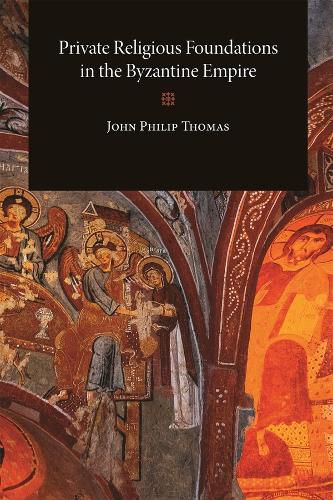Readings Newsletter
Become a Readings Member to make your shopping experience even easier.
Sign in or sign up for free!
You’re not far away from qualifying for FREE standard shipping within Australia
You’ve qualified for FREE standard shipping within Australia
The cart is loading…






Throughout its history, private religious foundations were prominent features of the ecclesiastical geography of the Byzantine Empire. Since the hierarchy of the church generally lacked the financial resources necessary for undertaking ambitious building programs, laymen took the initiative in providing churches, monasteries, and philanthropic institutions such as hospitals and orphanages. These foundations were important not only for the religious life of the empire, but also for its social and economic life. Many socially prominent Byzantines sought the fame that came to the builder of such a foundation, and many more owned them as family inheritances. A private religious foundation could serve as the core of a considerable family fortune that was bolstered by tax exemptions and imperial donations of landed property.
In this book, John Philip Thomas examines the nature, extent, and importance of the private ownership of ecclesiastical institutions in the Byzantine Empire. For over a thousand years these foundations were closely bound to the fortunes of the empire and its ruling classes. More durable than either, they survived the fall of the Byzantine state itself.
$9.00 standard shipping within Australia
FREE standard shipping within Australia for orders over $100.00
Express & International shipping calculated at checkout
Throughout its history, private religious foundations were prominent features of the ecclesiastical geography of the Byzantine Empire. Since the hierarchy of the church generally lacked the financial resources necessary for undertaking ambitious building programs, laymen took the initiative in providing churches, monasteries, and philanthropic institutions such as hospitals and orphanages. These foundations were important not only for the religious life of the empire, but also for its social and economic life. Many socially prominent Byzantines sought the fame that came to the builder of such a foundation, and many more owned them as family inheritances. A private religious foundation could serve as the core of a considerable family fortune that was bolstered by tax exemptions and imperial donations of landed property.
In this book, John Philip Thomas examines the nature, extent, and importance of the private ownership of ecclesiastical institutions in the Byzantine Empire. For over a thousand years these foundations were closely bound to the fortunes of the empire and its ruling classes. More durable than either, they survived the fall of the Byzantine state itself.